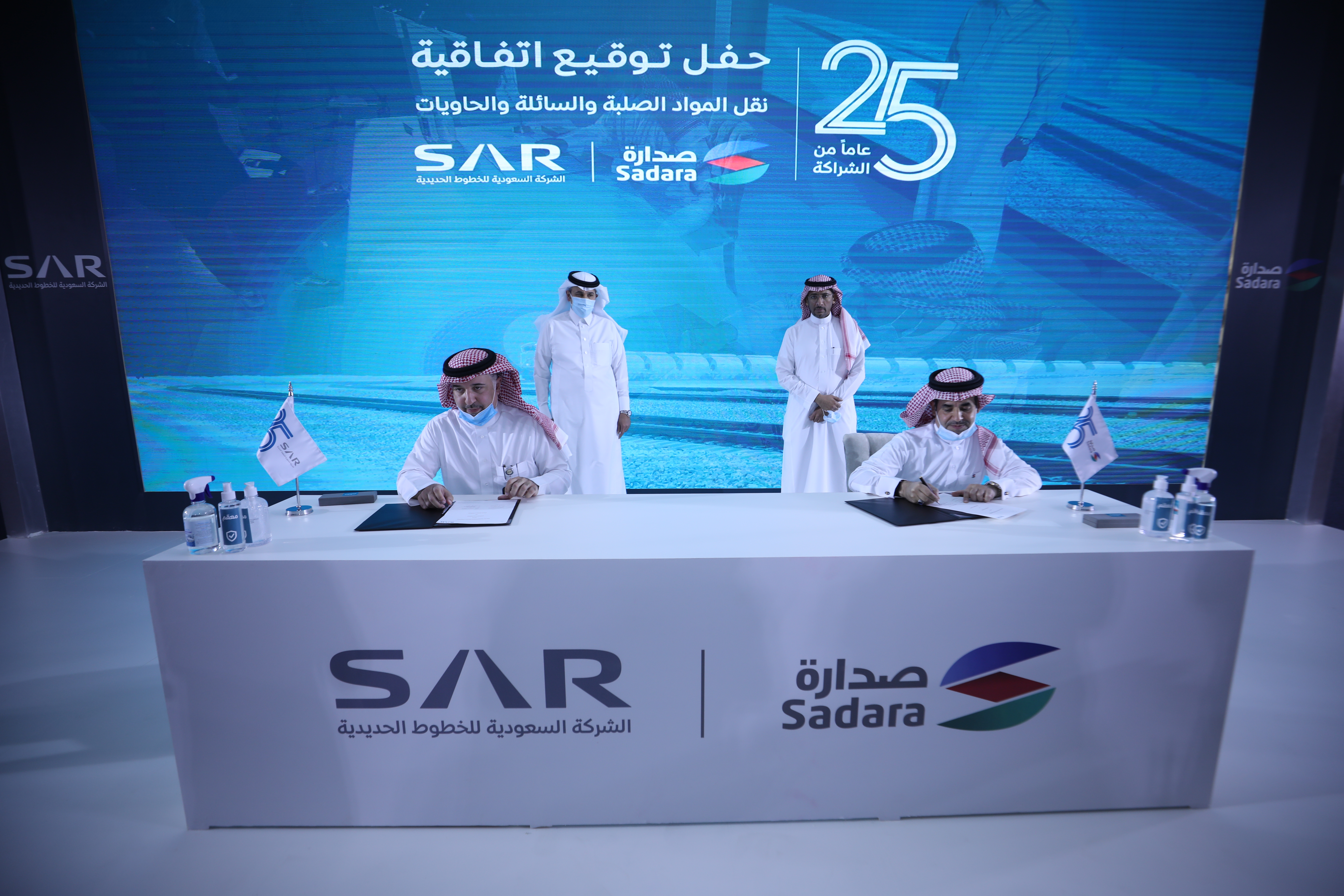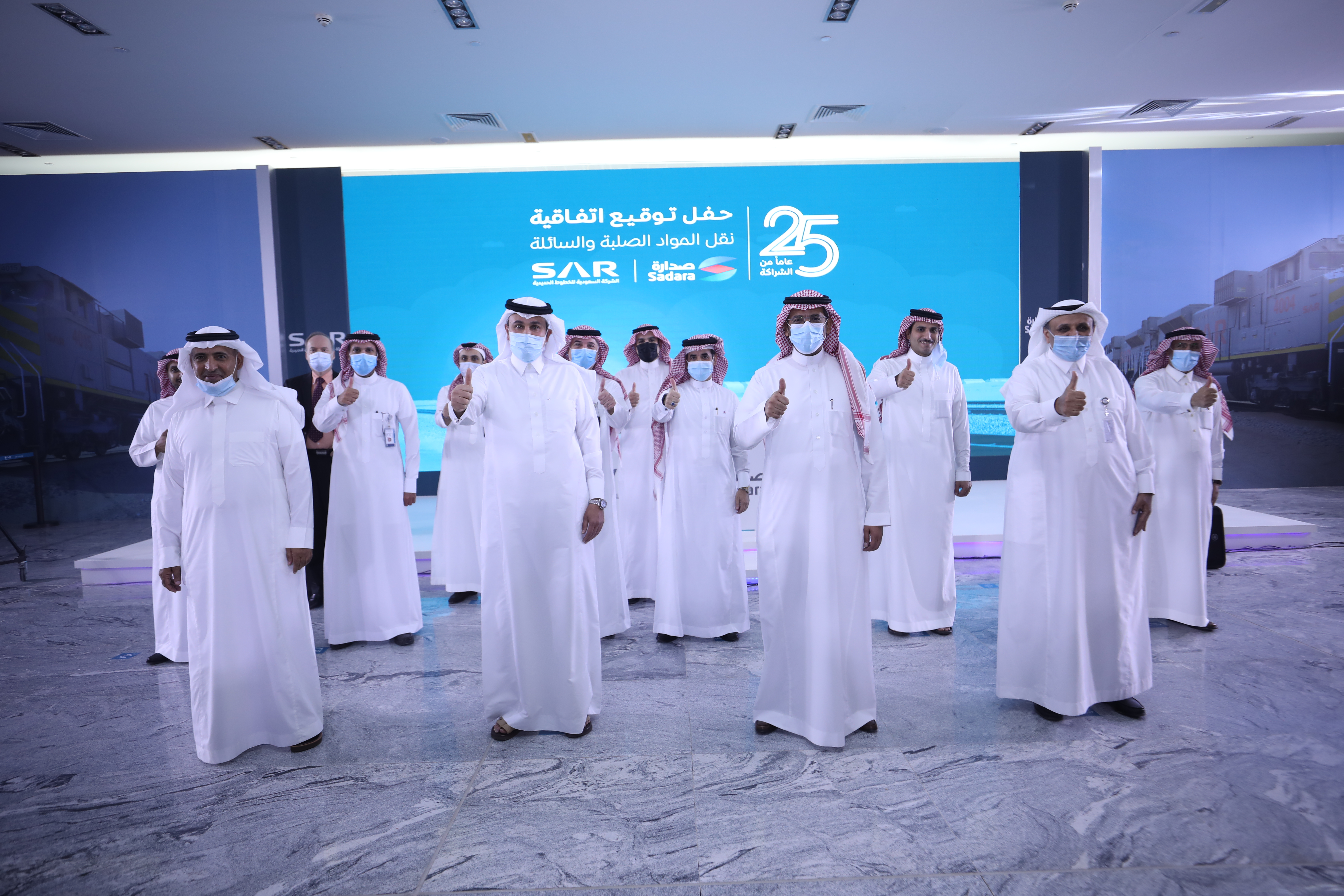Extends for quarter of century, reduced carbon emissions by 76%
SAR and Sadara signing an agreement to transport solid and liquid products and containers


RIYADH, Saudi Arabia, July 01, 2020 -- Saudi Railway Company (SAR) has signed with Sadara Chemical Company (Sadara) railway transport services agreement on Wednesday, July 01, 2020, in the presence of, His Excellency the Minister of Transportation, Head of the Board of Saudi Railway Company SAR, Engineer Saleh bin Nasser Al-Jasser, His Excellency Minister of Industry and Mineral Resources, Bandar bin Ibrahim Al-Khorayef, and a number of their excellencies.
His Excellency CEO of Saudi Railways Company SAR, Dr. Bashar bin Khalid Al-Malik, has signed the agreement with His Excellency CEO of Sadara Chemical Company, Dr. Faisal M. Al-Faqeer, it’s considered the first of its kind in Jubail industrial City, Sadara will start using the trains to transport liquid and solid products and containers as a primary means of transportation for the company.
It is a 25-year agreement, as it includes two trips a day from Sadara Chemical Campus to King Fahd Industrial Port, and 3 trips to Jubail Commercial Port, it is expected that about 125,000 containers will be transported annually.
His Excellency, Minister of Transportation and Head of the Board of Saudi Railways Company, Engineer, Saleh bin Nasser Al-Jasser, said on this occasion that this agreement confirms the ability of our national companies to take advantage of the available means to boost the logistical and industrial sector in line with the objectives of National Industrial Development and Logistics Program (NIDLP) and SAR Freight Train which is one of the ten longest freight trains in the world, is a mean for the industrial sector, and we will continue its further development and modernization and it continuously and effectively in accordance with the requirements of each stage.
Adding that the SAR Company has achieved positive numbers in the transfer of national wealth during the first half of this year, as the transferred quantities has already exceeded what was transferred for the same period last year despite all the challenges, bringing the total that was transferred since 2011 by railways until the first quarter of this year, more than 50 million tons of various products, as well as the Kingdom’s recent global leap in the quality of railways infrastructure by 23 ranks, ranking 26th globally.
CEO of Saudi Railway Company SAR, Dr. Bashar bin Khalid Al-Malik has explained that this agreement represents a prominent role that SAR provides in supporting the country's resources, in line with the Kingdom's 2030 vision, by supporting national industries in providing fast, safe and environmentally-friendly transportation solutions that are efficient and reliable.
Dr. Al-Malek pointed out the importance of this agreement lies in providing fast and safe transportation solutions, reducing the number of trucks on the roads -as SAR was able to remove more than 600,000 trucks from the road network, last year- empowering one of the important economic sectors, in addition to strengthening the infrastructure in general.
Al-Malik explained that the agreement contributes to achieving the requirements of Sadara Company in transporting its products in a safe and reliable way meeting the requirements of sectors compatible with the objectives of the National Industrial Development and Logistics Program (NIDLP).
Pointing out that, SAR providing distinguished railway transport services that fulfill the expectations of its clients, is its main goal, especially since it has achieved remarkable growth in transportation services in recent years that contributed to maximizing the use of national wealth, stressing SAR keenness to expand its client network.
Commenting on the signing, Dr. Faisal Al-Faqeer said, “This is a unique agreement, the first of its kind in the region involving rail transportation of liquid chemicals and similar products. The agreement signifies a new milestone for Sadara and highlights our commitment to embracing new and more efficient ways of doing business. In this instance, we are happy to formalize and move forward our initial MOU rail transportation project with SAR, as it is more efficient, cheaper and safer than transporting our products by trucks. An added benefit is the reduction of carbon emissions resulting from the daily use of trucks to transport products from our chemical complex to Jubail’s two ports and this in turn, will add an important element to the safety of road users in the province of Jubail.”
Dr. Al-Faqeer pointed out that this initiative reflects Sadara’s sense of social responsibility and its interest in the values of citizenship whose safety is one of its priorities.
In addition, the agreement provides Sadara commitment to transfer its products from the chemical complex that is located in Jubail Industrial City to export facilities in King Fahd Industrial Port and Jubail Commercial Port, and SAR commitment to provide services through the running of locomotives and freight vehicles to transport those products.
Sadara Company expected to achieve several positive results through this agreement, the most important of which is that railway transport replaces approximately 200,000 truckloads of Sadara products annually to Jubail’s ports. in addition to protecting the environment as a result of reducing harmful emissions by 73%.
On the other hand, the construction of the railway project in Jubail Industrial City is currently being completed, and it is expected that the transportation services of Sadara Company products will start in the second half of 2021.
Noting that, this is an extension of MOU that was signed at the launching ceremony of the National Industrial Development and Logistics Program (NIDLP) at the beginning of 2019 in the presence of His Royal Highness Prince Mohammed bin Salman bin Abdulaziz Al Saud - Crown Prince and chairman of the Council of Economic Affairs and Development, under the umbrella of the program’s initiative to increase the accommodation of freight trains on the North-South Railway.
His Excellency CEO of Saudi Railways Company SAR, Dr. Bashar bin Khalid Al-Malik, has signed the agreement with His Excellency CEO of Sadara Chemical Company, Dr. Faisal M. Al-Faqeer, it’s considered the first of its kind in Jubail industrial City, Sadara will start using the trains to transport liquid and solid products and containers as a primary means of transportation for the company.
It is a 25-year agreement, as it includes two trips a day from Sadara Chemical Campus to King Fahd Industrial Port, and 3 trips to Jubail Commercial Port, it is expected that about 125,000 containers will be transported annually.
His Excellency, Minister of Transportation and Head of the Board of Saudi Railways Company, Engineer, Saleh bin Nasser Al-Jasser, said on this occasion that this agreement confirms the ability of our national companies to take advantage of the available means to boost the logistical and industrial sector in line with the objectives of National Industrial Development and Logistics Program (NIDLP) and SAR Freight Train which is one of the ten longest freight trains in the world, is a mean for the industrial sector, and we will continue its further development and modernization and it continuously and effectively in accordance with the requirements of each stage.
Adding that the SAR Company has achieved positive numbers in the transfer of national wealth during the first half of this year, as the transferred quantities has already exceeded what was transferred for the same period last year despite all the challenges, bringing the total that was transferred since 2011 by railways until the first quarter of this year, more than 50 million tons of various products, as well as the Kingdom’s recent global leap in the quality of railways infrastructure by 23 ranks, ranking 26th globally.
CEO of Saudi Railway Company SAR, Dr. Bashar bin Khalid Al-Malik has explained that this agreement represents a prominent role that SAR provides in supporting the country's resources, in line with the Kingdom's 2030 vision, by supporting national industries in providing fast, safe and environmentally-friendly transportation solutions that are efficient and reliable.
Dr. Al-Malek pointed out the importance of this agreement lies in providing fast and safe transportation solutions, reducing the number of trucks on the roads -as SAR was able to remove more than 600,000 trucks from the road network, last year- empowering one of the important economic sectors, in addition to strengthening the infrastructure in general.
Al-Malik explained that the agreement contributes to achieving the requirements of Sadara Company in transporting its products in a safe and reliable way meeting the requirements of sectors compatible with the objectives of the National Industrial Development and Logistics Program (NIDLP).
Pointing out that, SAR providing distinguished railway transport services that fulfill the expectations of its clients, is its main goal, especially since it has achieved remarkable growth in transportation services in recent years that contributed to maximizing the use of national wealth, stressing SAR keenness to expand its client network.
Commenting on the signing, Dr. Faisal Al-Faqeer said, “This is a unique agreement, the first of its kind in the region involving rail transportation of liquid chemicals and similar products. The agreement signifies a new milestone for Sadara and highlights our commitment to embracing new and more efficient ways of doing business. In this instance, we are happy to formalize and move forward our initial MOU rail transportation project with SAR, as it is more efficient, cheaper and safer than transporting our products by trucks. An added benefit is the reduction of carbon emissions resulting from the daily use of trucks to transport products from our chemical complex to Jubail’s two ports and this in turn, will add an important element to the safety of road users in the province of Jubail.”
Dr. Al-Faqeer pointed out that this initiative reflects Sadara’s sense of social responsibility and its interest in the values of citizenship whose safety is one of its priorities.
In addition, the agreement provides Sadara commitment to transfer its products from the chemical complex that is located in Jubail Industrial City to export facilities in King Fahd Industrial Port and Jubail Commercial Port, and SAR commitment to provide services through the running of locomotives and freight vehicles to transport those products.
Sadara Company expected to achieve several positive results through this agreement, the most important of which is that railway transport replaces approximately 200,000 truckloads of Sadara products annually to Jubail’s ports. in addition to protecting the environment as a result of reducing harmful emissions by 73%.
On the other hand, the construction of the railway project in Jubail Industrial City is currently being completed, and it is expected that the transportation services of Sadara Company products will start in the second half of 2021.
Noting that, this is an extension of MOU that was signed at the launching ceremony of the National Industrial Development and Logistics Program (NIDLP) at the beginning of 2019 in the presence of His Royal Highness Prince Mohammed bin Salman bin Abdulaziz Al Saud - Crown Prince and chairman of the Council of Economic Affairs and Development, under the umbrella of the program’s initiative to increase the accommodation of freight trains on the North-South Railway.
Other News Articles
- Sadara Participates in the 17th Annual GPCA Forum
- Sadara Internal Campaign Raises 300,000 Riyals for Palestinians
- Sadara Announces Marco ten Bruggencate as Board Member
- Sadara’s EO/PO Pipelines Begin Supplies to PlasChem Park
- To exchange expertise and increase efficiency of production and investment TABADUL and Sadara Ink MoU to Develop Logistic Solutions for Petrochemical Industry